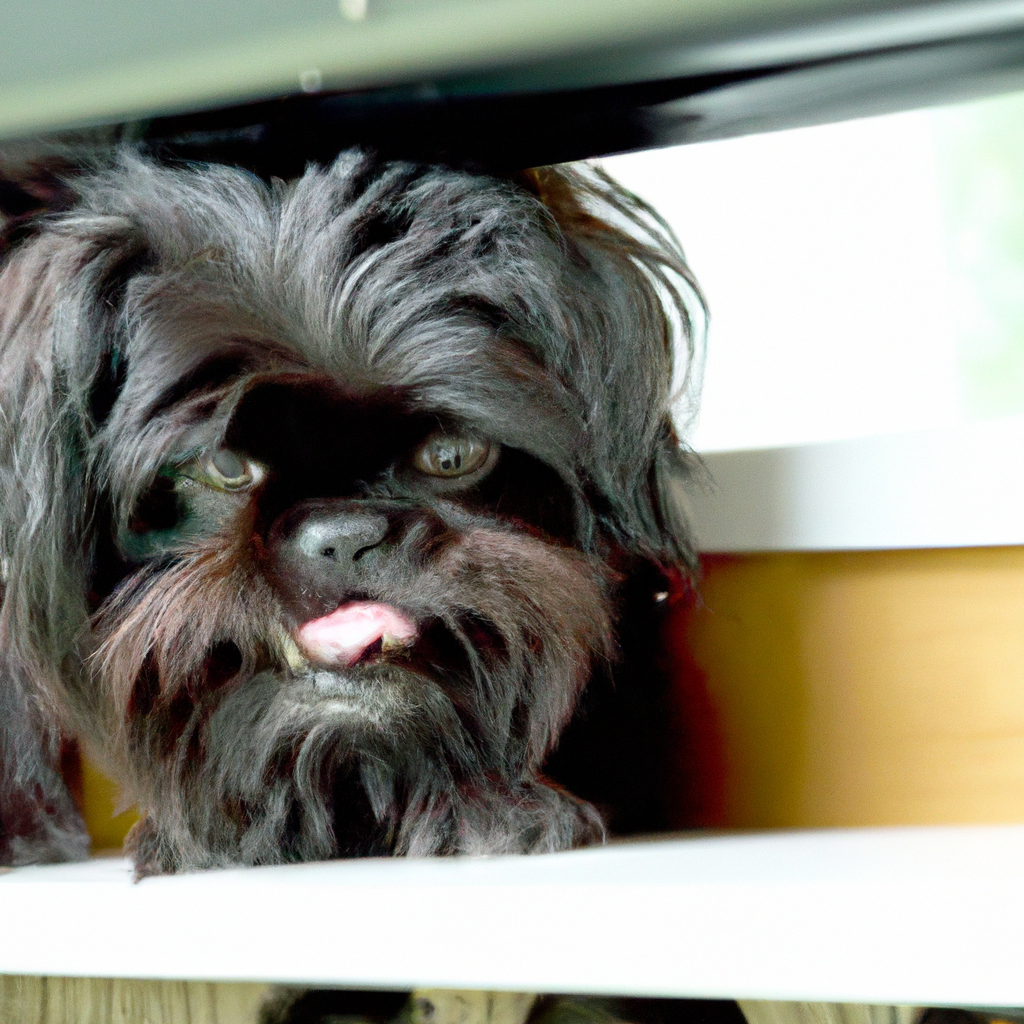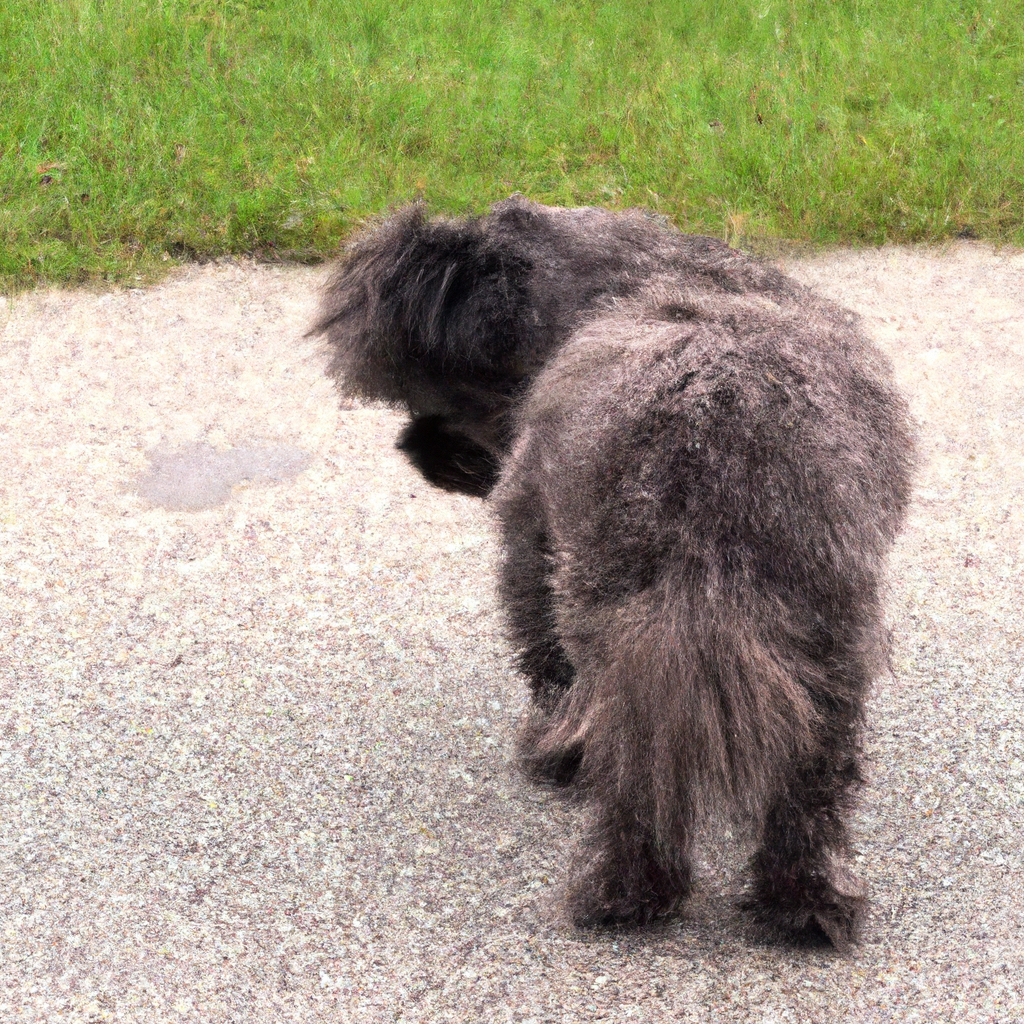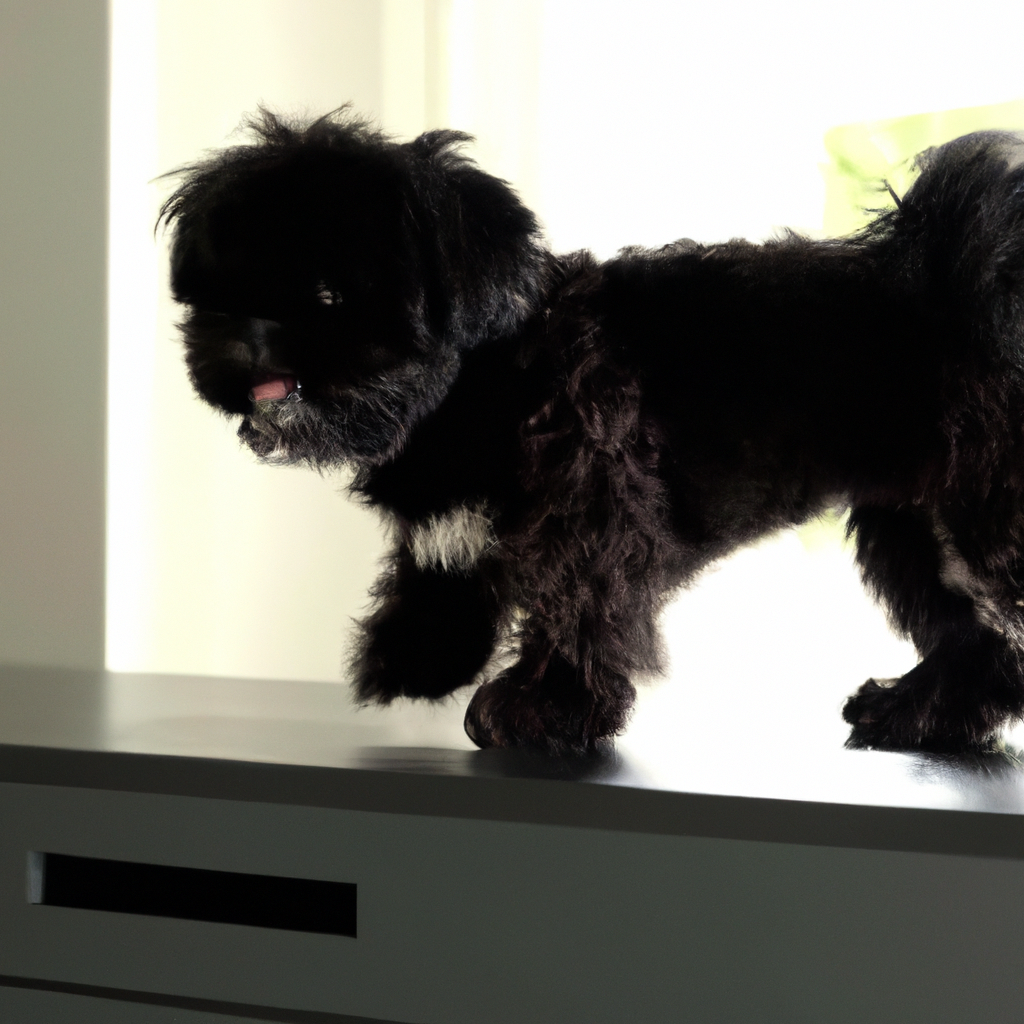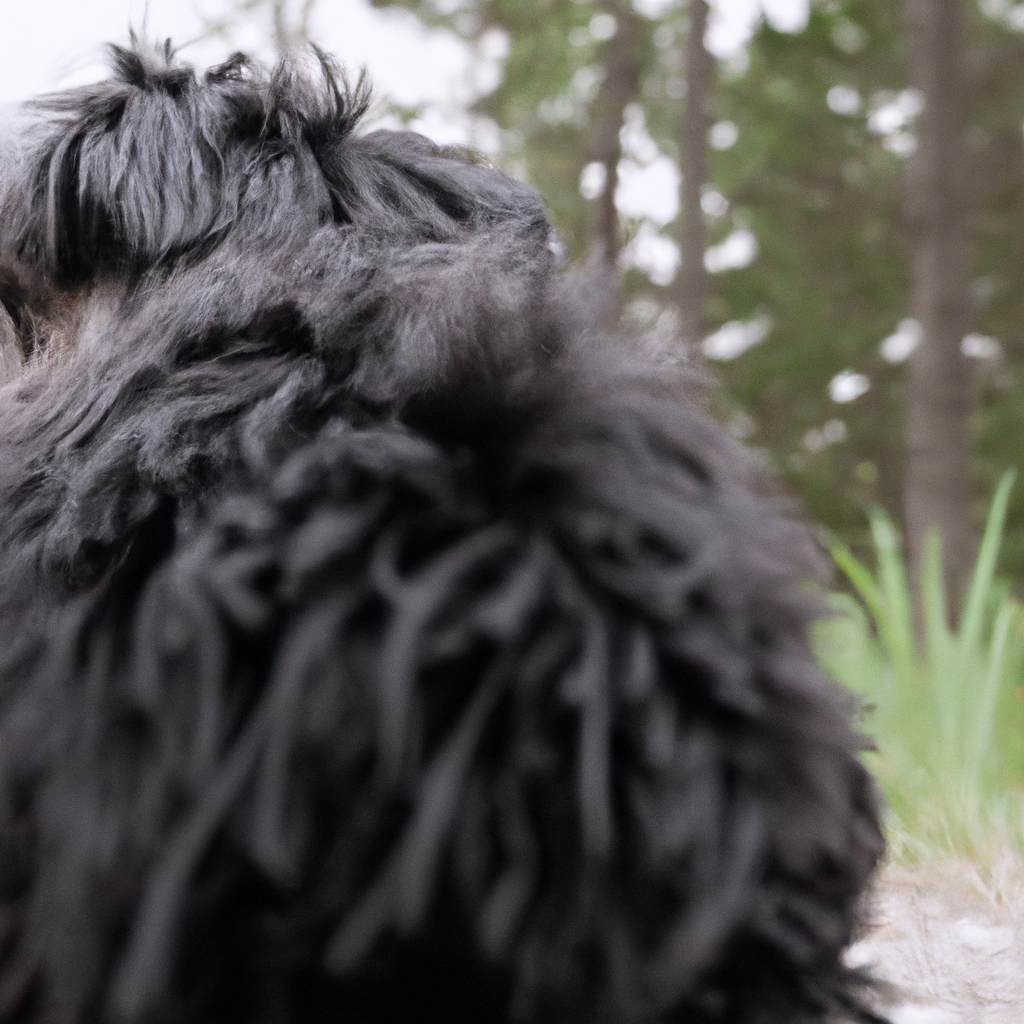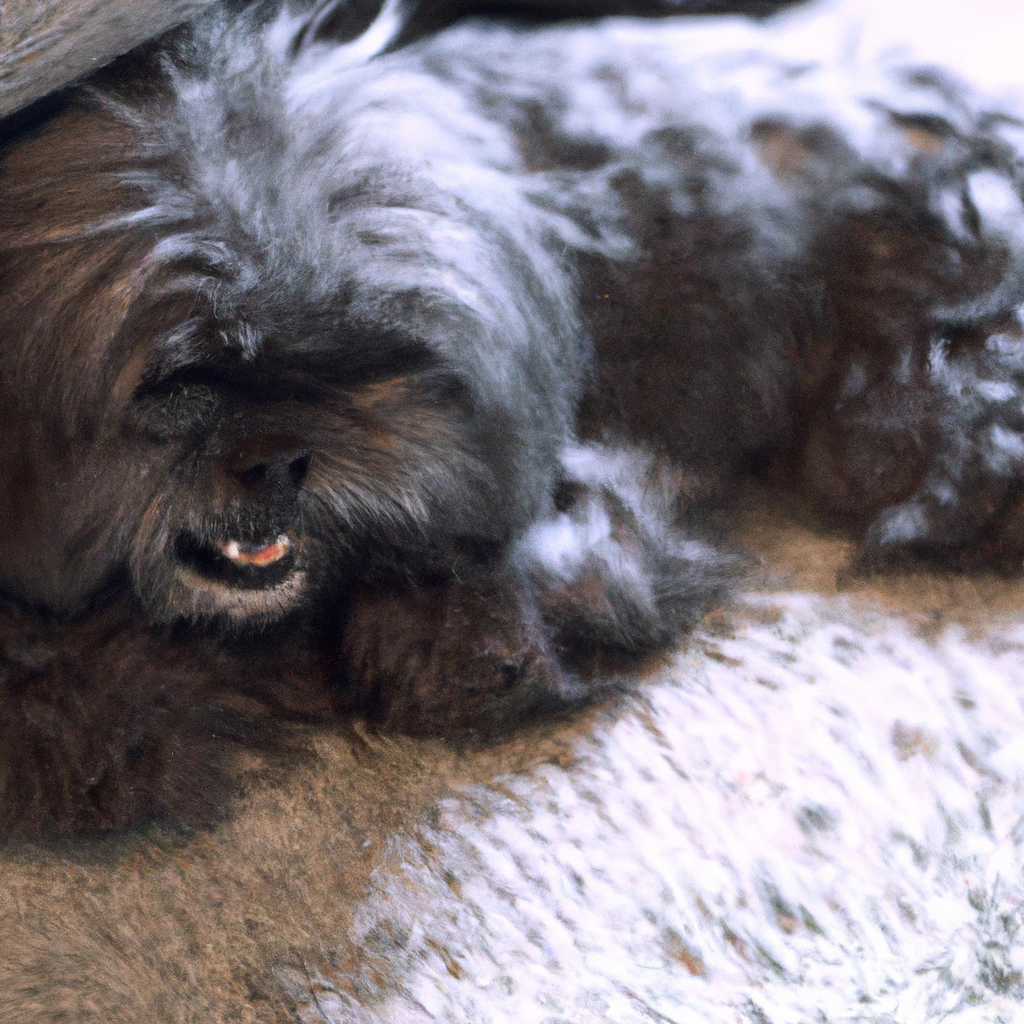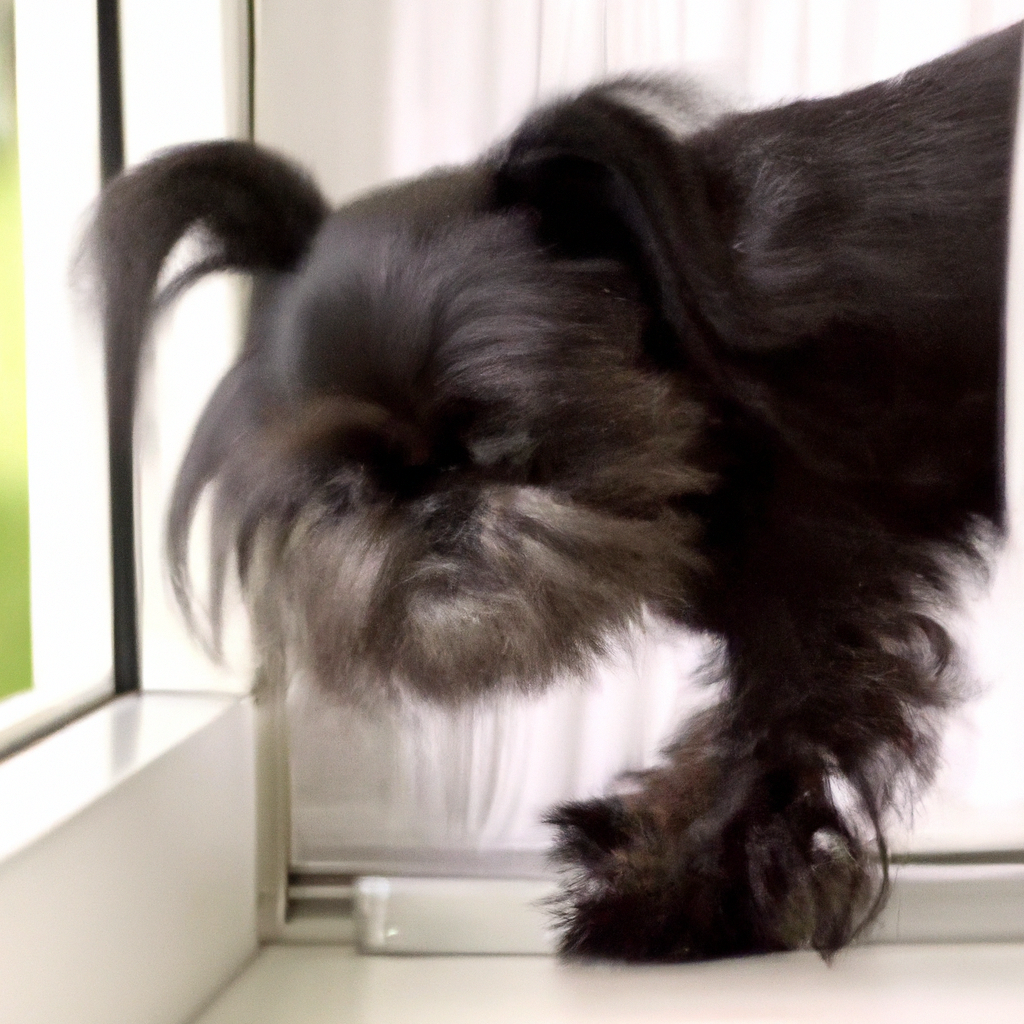Affenpinschers, often referred to as “Monkey Dogs” due to their distinctive face, are a small breed of dog with a big personality. Originating from Germany, these dogs are known for their playful and adventurous nature. However, like any breed, Affenpinschers can exhibit certain behavior problems. These can include excessive barking, stubbornness, and possessiveness, which can lead to aggression if not properly managed. Solutions to these behavior problems often involve consistent training from a young age, positive reinforcement, socialization with other dogs and people, and ensuring they get plenty of physical and mental stimulation. In some cases, professional help from a dog behaviorist may be necessary.
Understanding Affenpinschers: Common Behavioral Problems and Solutions
Affenpinschers, often referred to as “Monkey Terriers” due to their distinct primate-like appearance, are small but mighty dogs known for their playful and adventurous spirit. However, like any breed, they can exhibit certain behavioral problems. Understanding these issues and knowing how to address them can make a world of difference in your relationship with your Affenpinscher.
One common behavioral issue with Affenpinschers is their high energy levels. These dogs are naturally active and curious, which can sometimes translate into hyperactivity or restlessness. They may become destructive if they don’t get enough physical and mental stimulation. The solution to this problem is simple: regular exercise. A daily walk or play session can help burn off their excess energy and keep them calm. Mental stimulation is equally important, so consider puzzle toys or training sessions to keep their minds sharp.
Another issue that Affenpinscher owners often face is stubbornness. These dogs are intelligent and independent, which can sometimes make them resistant to training. They may ignore commands or try to do things their own way. Patience and consistency are key when dealing with a stubborn Affenpinscher. Use positive reinforcement techniques, such as treats or praise, to reward good behavior. Avoid harsh punishments, as they can lead to fear or aggression.
Speaking of aggression, this is another problem that can occur in Affenpinschers. They are naturally protective and can be wary of strangers, which can sometimes lead to aggressive behavior. Early socialization is crucial to prevent this issue. Expose your Affenpinscher to a variety of people, places, and situations from a young age to help them become more comfortable in different environments. If aggression continues to be a problem, consider seeking help from a professional dog trainer or behaviorist.
Barking is another common issue with Affenpinschers. They are alert dogs and will often bark to alert their owners of anything unusual. While this can be a useful trait, excessive barking can become a nuisance. Training your Affenpinscher to understand the “quiet” command can be helpful. Additionally, try to identify and eliminate any triggers that may be causing the excessive barking, such as boredom or anxiety.
Lastly, separation anxiety can be a problem in Affenpinschers. They form strong bonds with their owners and can become distressed when left alone. To help alleviate this issue, try to create a calm and comfortable environment for your dog when you’re not home. Leave them with familiar items, like a favorite toy or blanket, and consider using a dog crate to create a safe space. Gradually increase the amount of time you spend away from home to help your dog get used to being alone.
In conclusion, while Affenpinschers can exhibit certain behavioral problems, these issues can often be addressed with patience, consistency, and a little bit of understanding. Remember, every dog is unique and what works for one may not work for another. If you’re struggling with your Affenpinscher’s behavior, don’t hesitate to seek help from a professional. With the right approach, you can help your Affenpinscher become a well-behaved and happy member of your family.
How to Correct Aggression in Affenpinschers: A Comprehensive Guide
Affenpinschers, often referred to as “Monkey Terriers” due to their distinct primate-like appearance, are small but mighty dogs known for their playful and adventurous spirit. However, like any breed, they can sometimes exhibit behavioral issues, with aggression being one of the most common. But don’t worry, there are effective ways to correct this behavior and help your Affenpinscher become the loving and well-behaved pet you know they can be.
Firstly, it’s important to understand that aggression in Affenpinschers, or any dog breed for that matter, is often a response to fear or anxiety. These dogs are naturally protective and can become aggressive when they feel threatened or scared. Therefore, it’s crucial to ensure that your Affenpinscher feels safe and secure in their environment. This can be achieved by providing them with a comfortable and quiet space of their own, where they can retreat to when they feel overwhelmed.
Socialization is another key aspect of managing aggression in Affenpinschers. These dogs are known for their bold and fearless nature, which can sometimes lead to aggressive behavior towards other dogs or people. To prevent this, it’s essential to expose your Affenpinscher to a variety of people, animals, and environments from a young age. This will help them become more comfortable in different situations and reduce their likelihood of reacting aggressively.
Training is also a vital part of correcting aggression in Affenpinschers. Consistent, positive reinforcement training methods are the most effective way to teach your Affenpinscher appropriate behavior. Rewarding them for good behavior, such as being calm around other dogs or people, can help reinforce these positive actions and discourage aggressive behavior. It’s also important to avoid punishment-based training methods, as these can often exacerbate aggression and fear in dogs.
In some cases, aggression in Affenpinschers may be linked to underlying health issues. Pain or discomfort can cause dogs to become irritable and aggressive, so it’s important to rule out any medical problems if your Affenpinscher is showing signs of aggression. Regular vet check-ups can help identify any health issues early and ensure that your Affenpinscher is in the best possible health.
Lastly, if your Affenpinscher’s aggression continues despite your best efforts, it may be worth seeking professional help. A certified dog behaviorist or trainer can provide personalized advice and strategies to manage your Affenpinscher’s aggression. They can also help identify any triggers or underlying issues that may be contributing to your dog’s aggressive behavior.
In conclusion, while aggression can be a challenging behavior to manage in Affenpinschers, it’s certainly not insurmountable. By understanding the root causes of aggression and implementing effective strategies such as socialization, training, and regular vet check-ups, you can help your Affenpinscher become a well-behaved and loving companion. Remember, patience and consistency are key in this process. With time and effort, you and your Affenpinscher can enjoy a harmonious and happy life together.
Dealing with Separation Anxiety in Affenpinschers: Effective Strategies
Affenpinschers, affectionately known as “Monkey Dogs,” are small, energetic, and intelligent dogs that are known for their playful and sometimes mischievous behavior. However, like many other breeds, Affenpinschers can suffer from behavioral problems, one of the most common being separation anxiety. This issue can manifest in various ways, such as excessive barking, destructive behavior, or even attempts to escape when left alone. But don’t worry, there are effective strategies to help your Affenpinscher cope with separation anxiety.
Firstly, it’s important to understand that separation anxiety is often rooted in a dog’s fear of being alone. Affenpinschers are social animals that thrive on companionship and interaction. When left alone, they can become anxious and stressed, leading to the problematic behaviors mentioned earlier. Therefore, one of the most effective strategies to combat this issue is to gradually acclimate your Affenpinscher to being alone.
Start by leaving your dog alone for short periods, gradually increasing the duration over time. This can help your Affenpinscher understand that being alone is not something to fear and that you will always return. It’s crucial to ensure that these periods of solitude are positive experiences for your dog. You can achieve this by providing toys or treats that will keep your Affenpinscher entertained and distracted while you’re away.
Another effective strategy is to establish a consistent routine for your Affenpinscher. Dogs are creatures of habit, and a predictable schedule can provide a sense of security and comfort. Make sure to include regular feeding times, walks, playtime, and rest periods in your routine. This consistency can help reduce anxiety and stress in your Affenpinscher, making them more comfortable when left alone.
Exercise is also a key component in managing separation anxiety in Affenpinschers. These energetic dogs require regular physical activity to burn off energy and stay healthy. A tired dog is a happy dog, and a good workout can help reduce anxiety and promote relaxation. Try to schedule a walk or play session before you need to leave your Affenpinscher alone. This can help tire them out and make them more likely to rest while you’re away.
In some cases, professional help may be necessary to manage separation anxiety in Affenpinschers. If your dog’s anxiety is severe or if the strategies mentioned above are not effective, consider seeking advice from a professional dog trainer or a veterinary behaviorist. These experts can provide personalized guidance and treatment plans to help your Affenpinscher overcome their anxiety.
Lastly, remember that patience and understanding are key when dealing with separation anxiety in Affenpinschers. It can take time for your dog to adjust to being alone, and progress may be slow. However, with consistent effort and a lot of love, your Affenpinscher can learn to cope with separation anxiety and live a happier, healthier life.
In conclusion, dealing with separation anxiety in Affenpinschers can be challenging, but it’s not impossible. By gradually acclimating your dog to being alone, establishing a consistent routine, ensuring regular exercise, and seeking professional help if necessary, you can help your Affenpinscher overcome their fear of being alone. Remember, every dog is unique, and what works for one Affenpinscher may not work for another. Therefore, it’s important to be patient, understanding, and flexible in your approach.
Barking Issues in Affenpinschers: Causes and Remedies
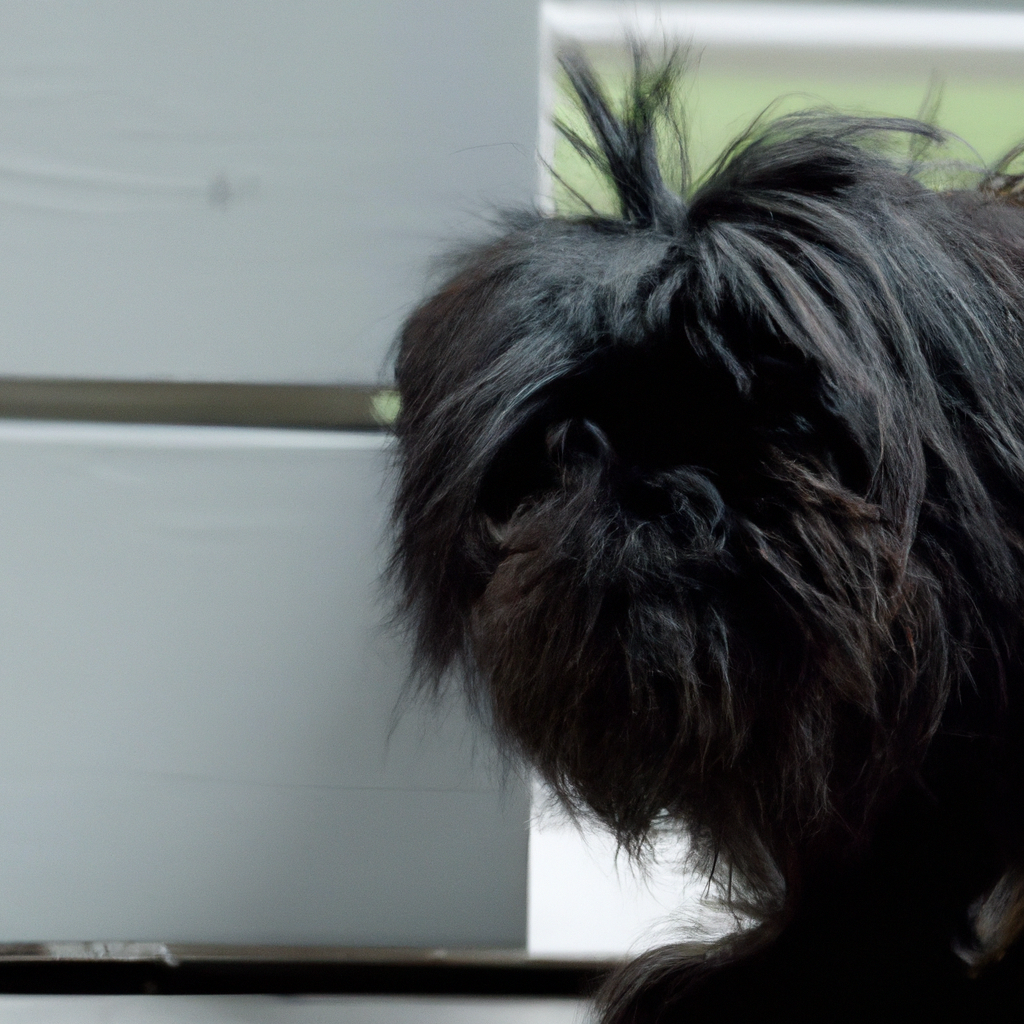
Affenpinschers, often referred to as “Monkey Terriers” due to their distinct primate-like appearance, are small but mighty dogs known for their playful and adventurous nature. However, like any breed, they can exhibit certain behavior problems, one of the most common being excessive barking. Understanding the causes behind this issue and knowing how to address it can significantly improve your relationship with your Affenpinscher.
Affenpinschers are naturally alert and protective, which can lead to a lot of barking. They are quick to sound the alarm at every new sight and sound, making them excellent watchdogs. However, this can become a problem when their barking becomes incessant and disruptive. It’s important to remember that barking is a form of communication for dogs. They bark to express a variety of emotions such as fear, anxiety, boredom, or excitement.
In the case of Affenpinschers, excessive barking could be a sign of separation anxiety. These dogs are known for their strong attachment to their owners and can become distressed when left alone. This anxiety often manifests itself through continuous barking. Similarly, Affenpinschers are energetic dogs that require regular physical and mental stimulation. If they are not getting enough exercise or engagement, they may resort to barking out of boredom.
Now that we’ve identified some potential causes, let’s explore some remedies. If your Affenpinscher is barking due to separation anxiety, it’s crucial to make your departures and arrivals as calm and low-key as possible. Avoid making a big fuss when you leave or return home, as this can heighten your dog’s anxiety. Gradually increasing the time your dog spends alone can also help them get used to your absence.
If boredom is the culprit, increasing your Affenpinscher’s physical activity and mental stimulation can help curb excessive barking. Regular walks, playtime, and puzzle toys can keep your dog entertained and help burn off excess energy. Training sessions can also be beneficial, as they not only provide mental stimulation but also strengthen the bond between you and your dog.
In some cases, it may be beneficial to seek professional help. Dog trainers or animal behaviorists can provide personalized strategies to manage your Affenpinscher’s barking. They can also help identify any underlying issues that may be contributing to the problem.
While it’s important to address excessive barking, it’s equally important to remember that some level of barking is natural and should be expected. After all, your Affenpinscher is just trying to communicate with you. The goal should not be to eliminate barking completely, but rather to manage it effectively.
In conclusion, excessive barking in Affenpinschers can be a sign of underlying issues such as separation anxiety or boredom. By understanding the causes and implementing appropriate remedies, you can help manage your Affenpinscher’s barking and improve their overall behavior. Remember, patience and consistency are key in addressing any behavior problem. With time and effort, you can help your Affenpinscher become a well-behaved and happy member of your family.
Affenpinschers and Destructive Chewing: Prevention and Solutions
Affenpinschers, affectionately known as “Monkey Dogs,” are small, energetic, and intelligent dogs that are known for their playful and sometimes mischievous behavior. One common issue that Affenpinscher owners often face is destructive chewing. This behavior can be frustrating, but with a little understanding and patience, it can be managed effectively.
Destructive chewing in Affenpinschers, like in many other breeds, is often a result of boredom, anxiety, or a lack of mental stimulation. These little dogs are full of energy and need plenty of physical and mental exercise to keep them happy and healthy. Without it, they may resort to chewing on furniture, shoes, or anything else they can get their paws on.
So, how can you prevent this destructive behavior? The first step is to ensure your Affenpinscher is getting enough exercise. Regular walks, playtime, and mental stimulation through puzzle toys or training can help burn off excess energy and keep your dog’s mind occupied. Remember, a tired dog is a good dog.
Next, consider providing your Affenpinscher with appropriate chew toys. These can help satisfy their natural urge to chew while also keeping their teeth clean and healthy. Be sure to choose toys that are safe and suitable for your dog’s size and chewing style. Some Affenpinschers may prefer softer toys, while others may enjoy tougher ones. It’s all about finding what works best for your individual dog.
In addition to providing physical outlets for your Affenpinscher’s energy, it’s also important to address any potential sources of anxiety. Affenpinschers are known for their loyalty and can sometimes become anxious when left alone for long periods. If separation anxiety is causing your dog to chew destructively, consider hiring a pet sitter or dog walker to provide companionship and care while you’re away.
Training can also be an effective solution for destructive chewing. Teaching your Affenpinscher commands like “leave it” or “drop it” can help you manage their behavior and prevent them from chewing on inappropriate items. Remember, consistency is key when it comes to training. It’s also important to reward good behavior with treats, praise, or playtime to reinforce positive habits.
Lastly, if your Affenpinscher’s destructive chewing persists despite your best efforts, it may be worth consulting with a professional dog trainer or behaviorist. They can provide personalized advice and strategies based on your dog’s specific needs and behaviors.
In conclusion, while destructive chewing can be a common issue in Affenpinschers, it’s not an insurmountable problem. With a combination of exercise, appropriate chew toys, training, and addressing any underlying anxiety, you can help your Affenpinscher channel their energy in a positive way. Remember, every dog is unique, and what works for one Affenpinscher may not work for another. It’s all about understanding your dog’s individual needs and finding solutions that work for both of you. After all, a happy, well-behaved Affenpinscher makes for a happy, stress-free owner.
Overcoming Toilet Training Challenges with Your Affenpinscher
Affenpinschers, often referred to as “Monkey Terriers” due to their distinct primate-like appearance, are a small breed of dog that is known for their playful and adventurous nature. However, like any other breed, they come with their own set of behavioral challenges. One of the most common issues that Affenpinscher owners face is toilet training. But don’t worry, with a little patience, consistency, and the right approach, you can overcome this hurdle and enjoy a harmonious relationship with your furry friend.
Toilet training an Affenpinscher can be a bit tricky due to their stubborn and independent nature. They are intelligent dogs, but they also have a strong will of their own, which can sometimes make them resistant to training. However, this doesn’t mean that they are impossible to train. It just means that you need to approach the task with a bit more patience and understanding.
Firstly, it’s important to establish a routine. Dogs thrive on routine and Affenpinschers are no exception. Set specific times for meals, play, and potty breaks. This will help your Affenpinscher understand when it’s time to eat, play, and go to the bathroom. Remember, consistency is key. The more consistent you are with the routine, the quicker your Affenpinscher will catch on.
Next, use positive reinforcement. Affenpinschers respond well to rewards. Whenever your dog successfully uses the bathroom outside, reward them with a treat or praise. This will help them associate going to the bathroom outside with positive experiences, making them more likely to repeat the behavior in the future.
However, accidents will happen, especially in the early stages of training. It’s crucial not to punish your Affenpinscher when they have an accident. This can create fear and confusion, which can actually hinder the training process. Instead, calmly clean up the mess and continue with the training. Remember, patience is key when toilet training an Affenpinscher.
In addition to these strategies, it can also be helpful to use a crate during the training process. Crate training can be an effective way to manage your Affenpinscher’s bathroom habits, as dogs naturally avoid soiling their sleeping areas. Make sure the crate is comfortable and inviting, and only use it for short periods of time. Never use the crate as a form of punishment.
Lastly, don’t forget to consult with a professional if you’re struggling with the training process. A professional dog trainer or a veterinarian can provide valuable advice and guidance, helping you navigate through the challenges of toilet training your Affenpinscher.
In conclusion, while toilet training an Affenpinscher can be a bit challenging due to their stubborn and independent nature, it’s certainly not an impossible task. With a consistent routine, positive reinforcement, patience, and the right approach, you can successfully toilet train your Affenpinscher. Remember, every dog is unique and what works for one might not work for another. So, don’t be afraid to try different strategies until you find what works best for your Affenpinscher. After all, the goal is to create a happy and healthy environment for both you and your furry friend.
Affenpinscher’s Stubbornness: Tips for Successful Training
Affenpinschers, often referred to as “Monkey Terriers” due to their distinct primate-like appearance, are small but mighty dogs known for their playful and adventurous spirit. However, like any breed, they come with their own set of behavioral challenges. One of the most common issues that Affenpinscher owners face is their dog’s stubbornness. But don’t worry, with the right approach, you can turn this stubbornness into a positive trait and successfully train your Affenpinscher.
Affenpinschers are intelligent and independent dogs, which can sometimes translate into stubbornness. They have a strong will and like to do things their own way. This can make training a bit of a challenge, but it’s not impossible. The key is to understand their personality and use it to your advantage.
Firstly, it’s important to remember that Affenpinschers are not being stubborn to annoy you. They are simply expressing their independence. So, instead of getting frustrated, try to see things from their perspective. They are small dogs in a big world, and they use their stubbornness as a way to assert themselves.
To successfully train your Affenpinscher, you need to make them see the benefit of following your commands. This breed is highly food motivated, so using treats as rewards can be very effective. However, be careful not to overdo it, as Affenpinschers can easily become overweight.
Another effective training method is to use positive reinforcement. Affenpinschers respond well to praise and attention. So, when they do something right, make sure to give them lots of praise and petting. This will make them associate good behavior with positive experiences, which will motivate them to repeat the behavior.
Affenpinschers are also very playful and energetic, so incorporating play into training sessions can be very beneficial. For example, you can use a favorite toy as a reward for good behavior. This will not only make training more fun for your Affenpinscher, but it will also help to burn off some of their energy, making them more focused and less likely to be stubborn.
Patience is key when training an Affenpinscher. They may not get it right the first time, or even the tenth time, but don’t give up. Keep the training sessions short and fun, and always end on a positive note. This will keep your Affenpinscher motivated and eager to learn.
Lastly, it’s important to be consistent. Affenpinschers are smart, and they will quickly pick up on any inconsistencies in your training. So, make sure to use the same commands and rewards each time, and always follow through. If you say ‘no’, mean it. If you promise a reward, deliver it. This will help your Affenpinscher understand what is expected of them, and they will be more likely to comply.
In conclusion, while Affenpinschers can be stubborn, with the right approach, you can turn this trait into a positive one and successfully train your dog. Remember to be patient, consistent, and to use positive reinforcement. With time and effort, your Affenpinscher will become a well-behaved and obedient companion.
Coping with Affenpinschers’ Hyperactivity: Management and Solutions
Affenpinschers, affectionately known as “Monkey Dogs,” are small but mighty creatures. They are known for their distinctive appearance, which includes a shaggy coat and a face that resembles a monkey, hence the nickname. However, these adorable dogs are not just about looks; they are also known for their high energy levels and hyperactivity, which can sometimes lead to behavioral problems. But don’t worry, there are ways to manage and solve these issues, ensuring a harmonious relationship between you and your Affenpinscher.
Firstly, it’s important to understand that Affenpinschers are naturally energetic and playful. They are curious creatures who love to explore their surroundings, and this can sometimes be mistaken for hyperactivity. However, when this energy is not properly channeled, it can lead to destructive behaviors such as chewing on furniture or excessive barking.
One of the most effective ways to manage an Affenpinscher’s hyperactivity is through regular exercise. These dogs require a good amount of physical activity to burn off their energy. This could be in the form of daily walks, playtime in the yard, or even agility training. Not only does this help to keep their energy levels in check, but it also provides mental stimulation, which is crucial for this intelligent breed.
In addition to physical exercise, mental stimulation is also key in managing an Affenpinscher’s behavior. Puzzle toys, obedience training, and interactive games can help to keep their minds sharp and focused. This can also help to curb any destructive behaviors, as they will be too busy engaging in these activities to cause any mischief.
Another important aspect of managing an Affenpinscher’s behavior is consistency. These dogs respond well to routine and structure, so it’s important to establish a consistent schedule for meals, exercise, and sleep. This can help to reduce any anxiety or restlessness, which can often be a trigger for hyperactivity.
Socialization is also crucial for Affenpinschers. These dogs are known to be a bit wary of strangers and can be territorial, which can lead to aggressive behaviors if not properly socialized. Introducing them to a variety of people, animals, and environments from a young age can help to ensure that they grow up to be well-rounded and well-behaved dogs.
Lastly, positive reinforcement is key when it comes to training an Affenpinscher. These dogs respond well to praise and rewards, so be sure to reward good behavior and ignore or redirect bad behavior. This can help to reinforce the behaviors you want to see, while discouraging those you don’t.
In conclusion, while Affenpinschers can be a bit of a handful with their high energy levels and potential for behavioral problems, these issues can be effectively managed with the right approach. Regular exercise, mental stimulation, consistency, socialization, and positive reinforcement are all key components in managing an Affenpinscher’s behavior. With patience, understanding, and a little bit of effort, you can ensure that your Affenpinscher is not only well-behaved, but also happy and healthy.Affenpinschers are generally known for their bold, curious, and playful nature. However, like any breed, they can exhibit behavior problems such as excessive barking, stubbornness, and separation anxiety. These issues can be mitigated through consistent training from a young age, socialization with other dogs and people, and providing them with enough physical and mental stimulation. Regular exercise can help manage their energy levels and reduce anxiety, while positive reinforcement can encourage good behavior. In severe cases, professional help from a dog behaviorist may be necessary. Therefore, while Affenpinschers can have behavior problems, these can be managed and minimized with the right approach and commitment.
